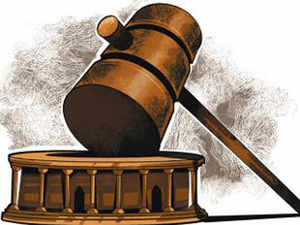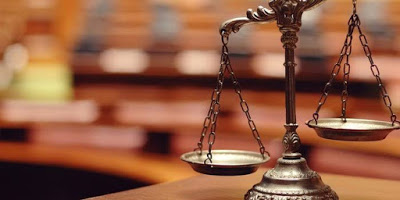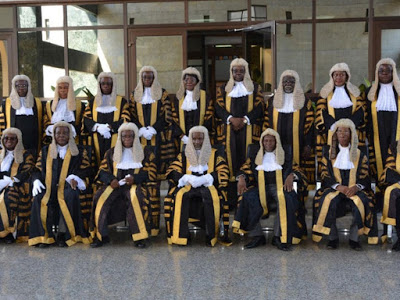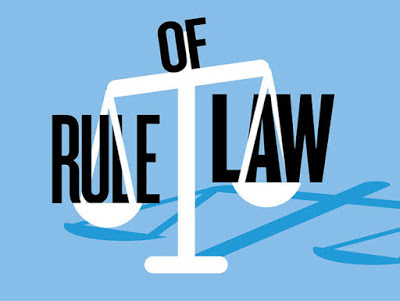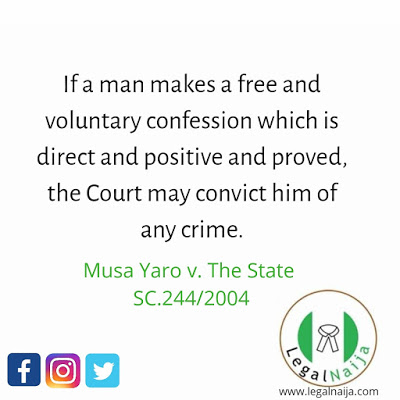Long Title
BY HIS STATEMENT WHILE SUSPENDING THE CHIEF JUSTICE OF NIGERIA FROM OFFICE, OUR PRESIDENT HAS SURPASSED HIMSELF IN THE SUBVERSION OF THE CONSTITUTION
by
Professor Ben Nwabueze
President Buhari’s suspension of the Chief Justice of Nigeria (CJN) from office is, in itself, a most condemnable subversion of the Constitution, but his statement while announcing it to the public makes the action so absurdly subversive. Hear what he said:
“A short while ago, I was served with an Order of the Code of Conduct Tribunal issued on Wednesday 23rd January, 2019 directing the suspension of the Chief Justice of Nigeria, Honourable Justice Walter Nkanu Samuel Onnoghen from office pending final determination of the cases against him at the Code of Conduct Tribunal and several other fora relating to his alleged breach of the Code of Conduct for Public Officers.
It is against this background that I have received the Order of the Code of Conduct Tribunal directing me to suspend the Chief Justice pending final determination of the cases against him.
It also explains why I am not only complying immediately but with some degree of relief for the battered sensibilities of ordinary Nigerians whose patience must have become severely overtaxed by these anomalies.
In line with this administration’s avowed respect for the Rule of Law, I have wholeheartedly obeyed the Order of the Code of Conduct Tribunal dated 23rd January 2019.”
The “Administration’s avowed respect for the Rule of Law” and for obedience of court orders sound like a deliberate perversion of truth, as witness Dasuki’s continued detention four years after a court of law ordered his release on bail, and same as Ibrahim Yaquob El Zakzaky two years after he was granted bail.
The President’s statement raises several questions, the most crucial of which is as to whether the CCT has the power to order or direct the President to suspend the CJN. Second, whether the President, incarnating the Nigerian state, and as guardian of its Constitution, is bound to carry out the order, even when he knows, as he ought to know, that he has no power to suspend the CJN. Third, do the circumstances in which the order of the CCT was obtained not suggest a pre-meditated plan to subvert the Constitution?
With respect to the first question above, the suspension is manifestly subversive of paragraph 18 of the Fifth Schedule to the Constitution (1999), which provides as follows:
“18.(1)Where the Code of Conduct Tribunal finds a public officer guilty of contravention of any of the provisions of this Code it shall impose upon that officer any of the punishments specified under sub-paragraph
(2) of this paragraph and such other punishment as may be prescribed by the National Assembly.
(2)The punishment which the Code of Conduct Tribunal may impose shall include any of the following –
(a)vacation of office or seat in any legislative house, as the case may be.
(b)disqualification from membership of a legislative house and from the holding of any public office for a period not exceeding ten years; and
(c)seizure and forfeiture to the State of any property acquired in abuse or corruption of office.
(4)Where the Code of Conduct Tribunal gives a decision as to whether or not a person is guilty of a contravention of any of the provisions of this Code an appeal shall lie as of right from such decision or from any punishment imposed on such person to the Court of Appeal at the instance of any party to the proceedings.
It is clear from paragraph 18 that:
(a) only the CCT itself can order vacation of or suspension from office; the President is not empowered to do so, and cannot be ordered or directed by the CCT to do so;
(b) more importantly, the CCT cannot make an order vacating an office or suspending a person from office until the trial before it is completed and the accused person is found “guilty of contravention of any of the provisions of this Code”; the trial in this case is only just commencing;
(c) the right of appeal to the Court of Appeal conferred by paragraph 18(4) of the Fifth Schedule is from a decision of the CCT finding the accused person guilty of contravention of the Code, not from the action of the President suspending the accused person from office even when the action (suspension) is on the direction of the CCT; the denial of that right is a violation of the Constitution.
In conclusion, the CCT acted ultra vires the Constitution in making the order directing the President to suspend the CJN from office. The suspension is unconstitutional, null and void.
The second question raised above, though not as crucial, is remarkable for its great intricacy. The impression created by his statement is that the President is trying to hide under the cover of the principle that an order of court directing him to do something imposes upon him a duty to carry out the order, notwithstanding that he does not have the power to do the thing in question, and that we are thereby precluded from enquiring as to whether or not he in fact has the necessary power.
The ex parte order the President obtained from the CCT directing him to suspend the CJN from office does not, and cannot, erase the fact that he lacks the power to do that. The New Webster Dictionary of the English Language defines “suspend” to mean “to remove temporarily from an office, to cause to cease for a time from operation or effect”. The CJN is both the head of the judiciary, in which role he exercises largely administrative functions, as well as a justice of the Supreme Court; his removal (or suspension) from office as CJN can only be effected by the President with the support of two-thirds majority of the Senate, while his removal as an ordinary justice of the Supreme Court is by the President on the recommendation of the National Judicial Council (NJC) – section 292 Constitution 1999. The suspension (removal) of the CJN from office by the President does not comply with the two requirements of section 292 of the Constitution and is therefore null and void, notwithstanding that it is ordered by the CCT.
The President had followed the suspension of the CJN with the appointment of the most senior justice of the Supreme Court as Acting CJN. The validity of the acting appointment depends on whether there is a vacancy in the office. Without a vacancy, no one can validly be appointed to the office in an acting capacity. Be that as it may, an acting appointment must comply either with any special constitutional provisions relating thereto or, if there is none, then, with the general provisions governing the appointment of a CJN. These require the appointment to be made by the President on the recommendation of the NJC subject to confirmation by the Senate: section 231(1). The 1999 Constitution has no special provision relating to the appointment of a CJN in acting capacity. The general provisions in section 231(1) therefore apply. The circumstances surrounding the suspension of Onnoghen and the hurried swearing-in of Mohammed as Acting CJN suggest that section 231(1) is not complied with in the swearing-in of the latter. The acting appointment is therefore null and void.
In this connection, section 231(4) of the 1999 Constitution differs significantly from section 211(4) of the 1979 Constitution, which reads:
“(4)If the office of Chief Justice of Nigeria is vacant, or if the person holding the office is for any reason unable to perform the functions of the office, then until a person has been appointed to and has assumed the functions of that office, or until the person holding the office has resumed those functions, the functions shall be performed by a person to be designated from time to time in that behalf by the President, acting in his discretion, from among the Justices of the Supreme Court.
Section 231(4) of the 1999 Constitution is certainly a significant advance in our democratic evolution. What the President has done by the suspension of the CJN in his discretion without recourse to the Senate (or the NJC) is to take us back to the era of personal rule, which is the form of rule to which his career as a military commander has accustomed him. Personal rule and dictatorship is anathema to Nigerians. We want nothing more of that obnoxious system of rule.
After the Federal High Court (FHC) has ordered a stay of proceedings in the prosecution against the CJN and adjourned the case until a named date, the President, being the alter ego of the Federal Republic of Nigeria (FRN), the named complainant, went behind the scene and surreptitiously got the CCT, the supposed impartial arbiter, to order the suspension of the CJN, the other party in the case. This is subversion unchained and running wild to devour the defendant in the suit, and to stifle the system of constitutional restraints on power. By this action the President has lost all his integrity and fitness to govern, and should not remain in office.
The ex parte order issued by the CCT, on which the President relied as authority for suspending the CJN, calls in question the integrity of its chairman, Justice Danladi Umar, as well as his impartiality as arbiter in the matter. Allegation of corruption has been levelled against Justice Umar in the Sunday Vanguard of 15th November, 2015. The newspaper report discloses an investigation by the Economic and Financial Crimes Commission (EFCC) of a N10 million corruption allegation against Umar as chairman of the CCT and the former Deputy Controller-General of Customs, Rasheed Taiwo, N1.8 million of which had reportedly been paid by Taiwo and collected on Umar’s behalf by his personal assistant, Gambo Abdullahi. The newspaper report also disclosed that the two other members of the CCT, Robert Odu and Agwage Atedze, feeling so embarrassed by the allegation, had refused to sit with Umar, and that in a joint letter to former President Goodluck Jonathan, dated April 4, 2014, the two members had said as follows:
“May we with respect draw His Excellency’s attention to the allegation of N10 million bribe made against Justice Danladi Yakubu Umar, current chairman of Code of Conduct Tribunal, Abuja, which is being investigated by the EFCC.
“We, the two members of the CCT and the entire staff, are embarrassed and saddened by this allegation because a tribunal set up to check corruption should not be accused of being corrupt. This would not be in keeping with the transformation agenda of the administration.
“We are mindful of the fact that the Federal Government has zero tolerance policy for corruption, and this is the reason for the establishment of the CCT as one of the agencies to fight corruption in all its ramifications.
“It is our prayer therefore that this allegation will be looked into so that the tribunal can start sitting in the interest of litigants and their counsel.”
The Sunday Vanguard of November 15, 2015 further reported that, based on findings of its investigations on the matter, the EFCC raised a two-count charge against Umar and his PA, Gambo Abdullahi, but for reasons unknown, the Commission later dropped Umar’s name from the charge sheet and took only his PA to court, which left Umar to continue functioning as CCT Chairman and to preside over Saraki’s case, sitting with one other member, Agwadza Atedze, who earlier signed a letter declining to continue sitting with Umar. In the course of the trial of Gambo Abdullahi before the CCT presided over by the same Justice Umar as chairman, the Court of Appeal made an order in March 2018 banning him (Justice Umar) from participating further in the case.
The same Sunday Vanguard issue again reported that, based on the report and findings of the EFCC investigations, the former Attorney-General of the Federation (AGF), Mohammed Adoke SAN, wrote on May 7, 2015 to former President Goodluck Jonathan, as follows:
“I am of the humble opinion that the current state of affairs in which the CCT is unable to sit while the institution is increasingly diminished by a pall of suspicion, should not be allowed to fester as it will expose the institution to public ridicule and undermine this administration’s effort to combat corruption.
“IN the light of the foregoing therefore, Your Excellency may wish to initiate the necessary steps for the removal of the CCT chairman from office.”
It is surprising that in spite of all this, Justice Umar is still in office as chairman of the CCT, which suggests that he is being kept there as part of a pre-planned subversive design aimed at manipulating the 2019 presidential election.
This sad episode in our history would not be completely resolved by the resignation of Justice Onnoghen, as is being suggested in some quarters, unless the President, as the person who brought this whole mess upon us, also resigns. The Attorney-General of the Federation (AGF), Abubakar Malami (SAN), and Justice Danladi Umar must also resign.
Professor Ben Nwabueze
Lagos,
31st January, 2019
